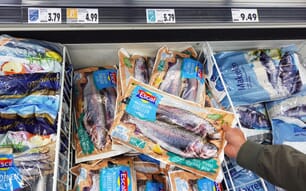The deep ocean surrounding Europe is one of the most biologically rich and diverse areas of the planet. A new regulation to effectively protect this area from the destructive impact of deep-sea fishing, including through phasing out bottom trawl fishing in the deep-sea, would be one of the EU’s most significant legislative achievements.
The European Council is currently debating a new regulation for the management of deep-sea fisheries to protect deep-sea ecosystems from the destructive impact of seabed trawling. European Commissioner Maria Damanaki has proposed a phase-out of the use of bottom trawls in the deep-sea and a shift to low impact, selective fishing gears and practices.
New research published in the Proceedings of the National Academy of Sciences reinforces scientific concerns, concluding that deep-sea bottom trawling “represents a major threat to the deep seafloor ecosystem at the global scale”.
Numerous scientific reports published by the International Council for the Exploration of the Sea, the European Union’s Hermione Project, the UN Environment Programme and others have highlighted the destructive nature of bottom trawling to slow growing, low-productivity deep-sea fish species and deep-sea ecosystems such as cold-water coral reefs, sponge fields, and other deep-sea habitats found along the continental slope and on seamounts in the Northeast Atlantic.
The United Nations General Assembly has called on all nations to “urgently adopt” conservation and management measures “to address the impact of destructive fishing practices, including bottom trawling that has adverse impacts on vulnerable marine ecosystems” such as cold-water corals, seamounts, and hydrothermal vents.
In a letter to the UK Parliamentary Under Secretary of State for farming, food and marine environment, George Eustace MP in March of this year, the Deep Sea Conservation Coalition on behalf of NGO partners, Bloom, Client Earth, Greenpeace, Marine Conservation Society, Oceana, Seas At Risk and The Pew Charitable Trusts called on the UK government to play a lead role in the Council negotiations to end overfishing of the deep-sea, protect vulnerable deep-sea ecosystems from the impacts of destructive fishing gears and practices, require environmental impact assessments for deep-sea fisheries and phase-out the use of bottom trawl gear.


